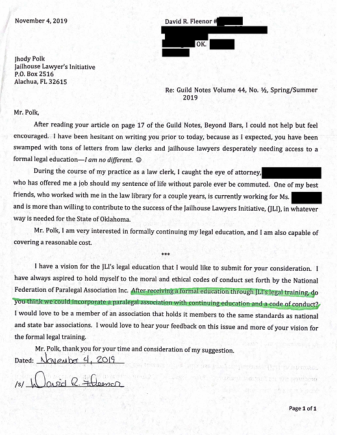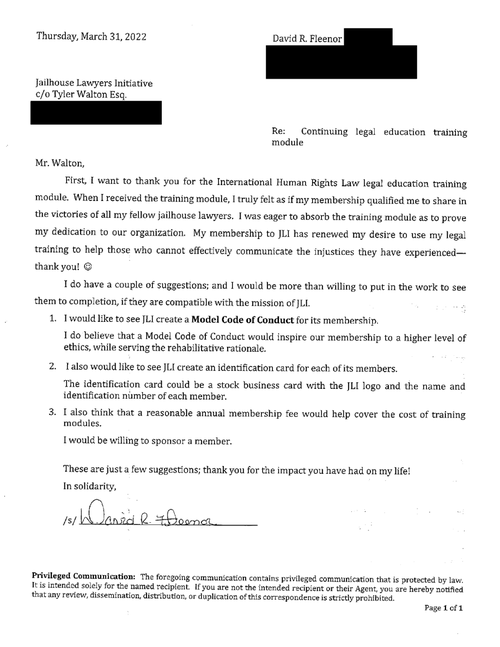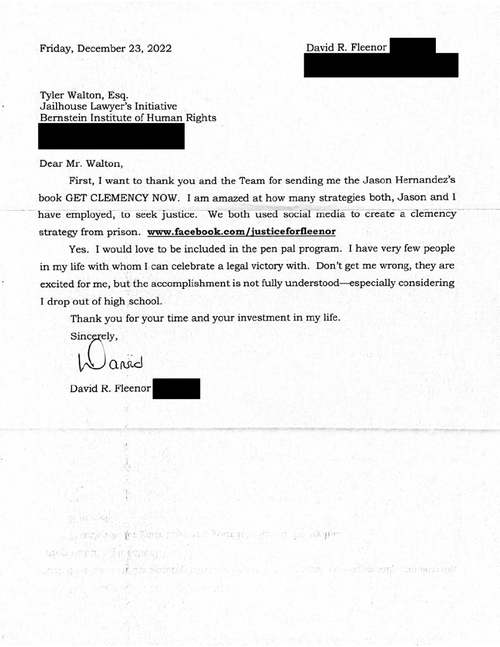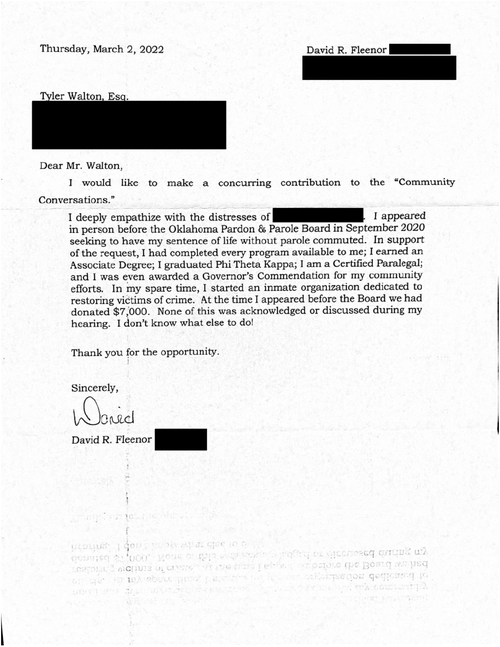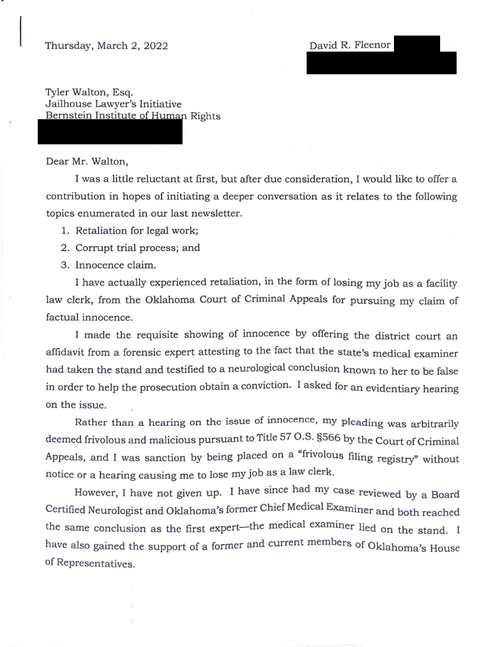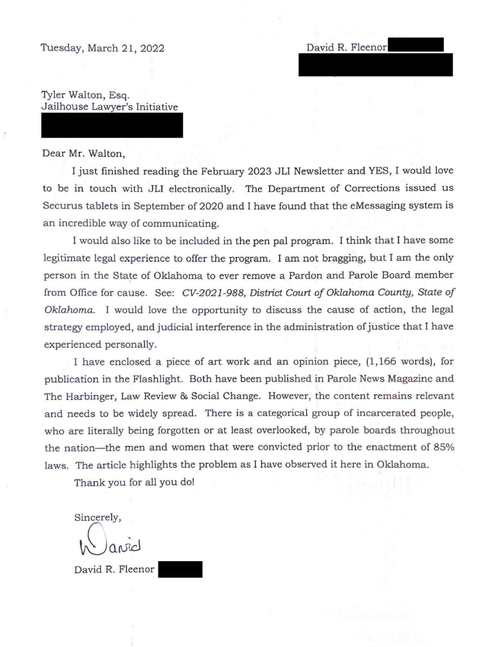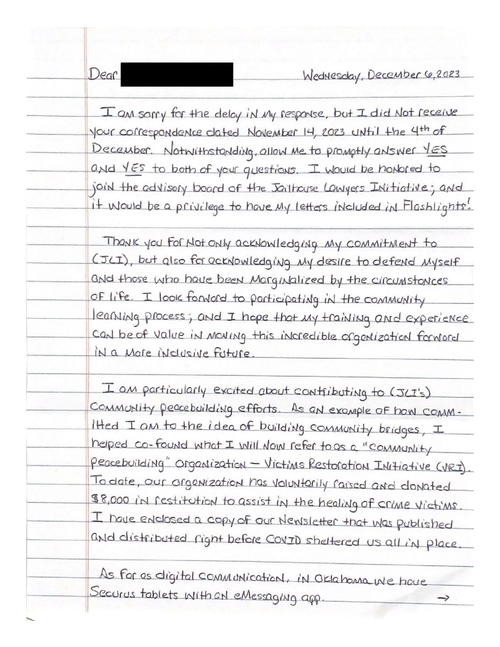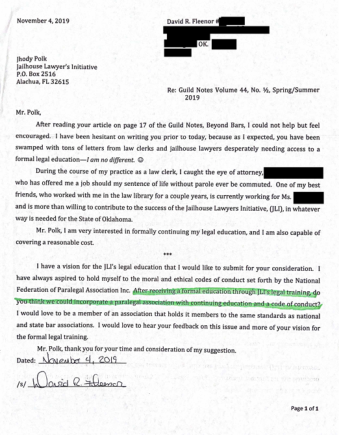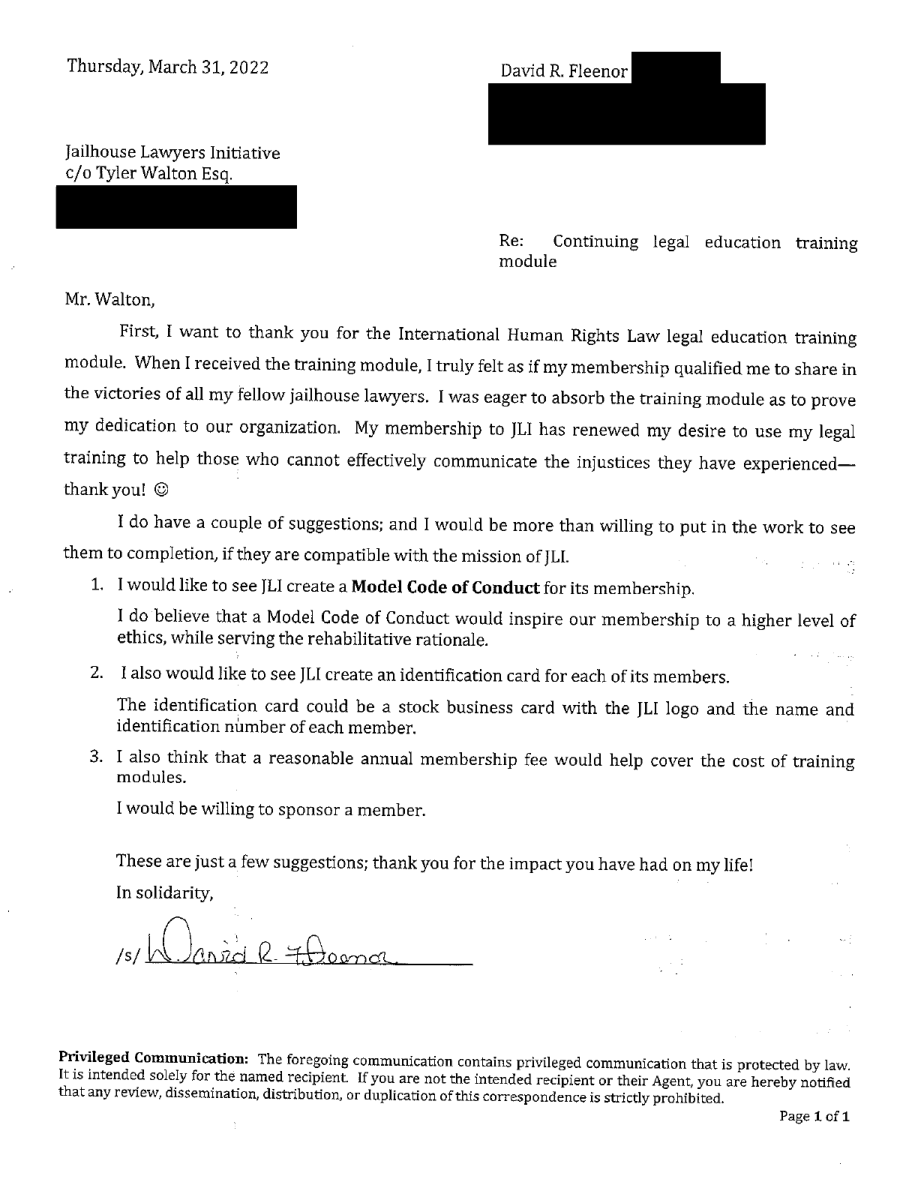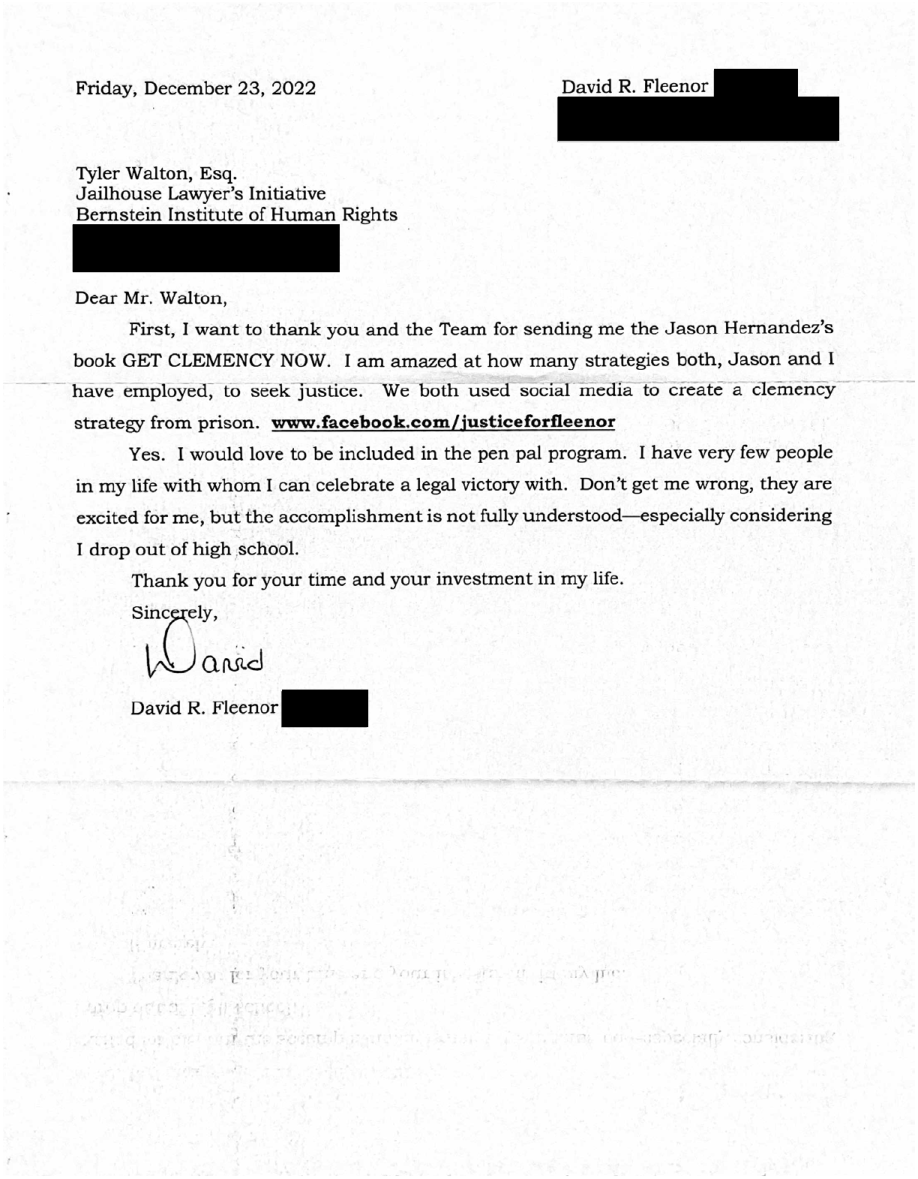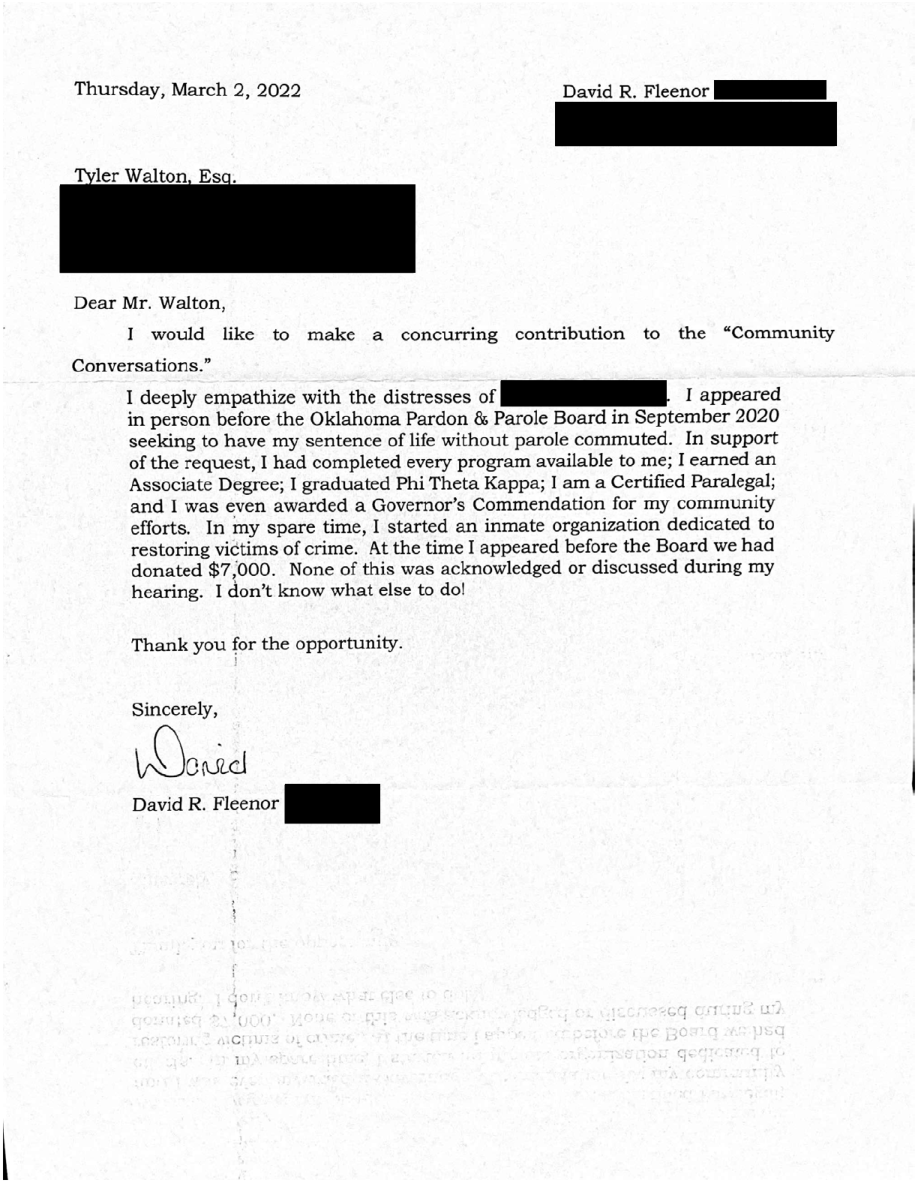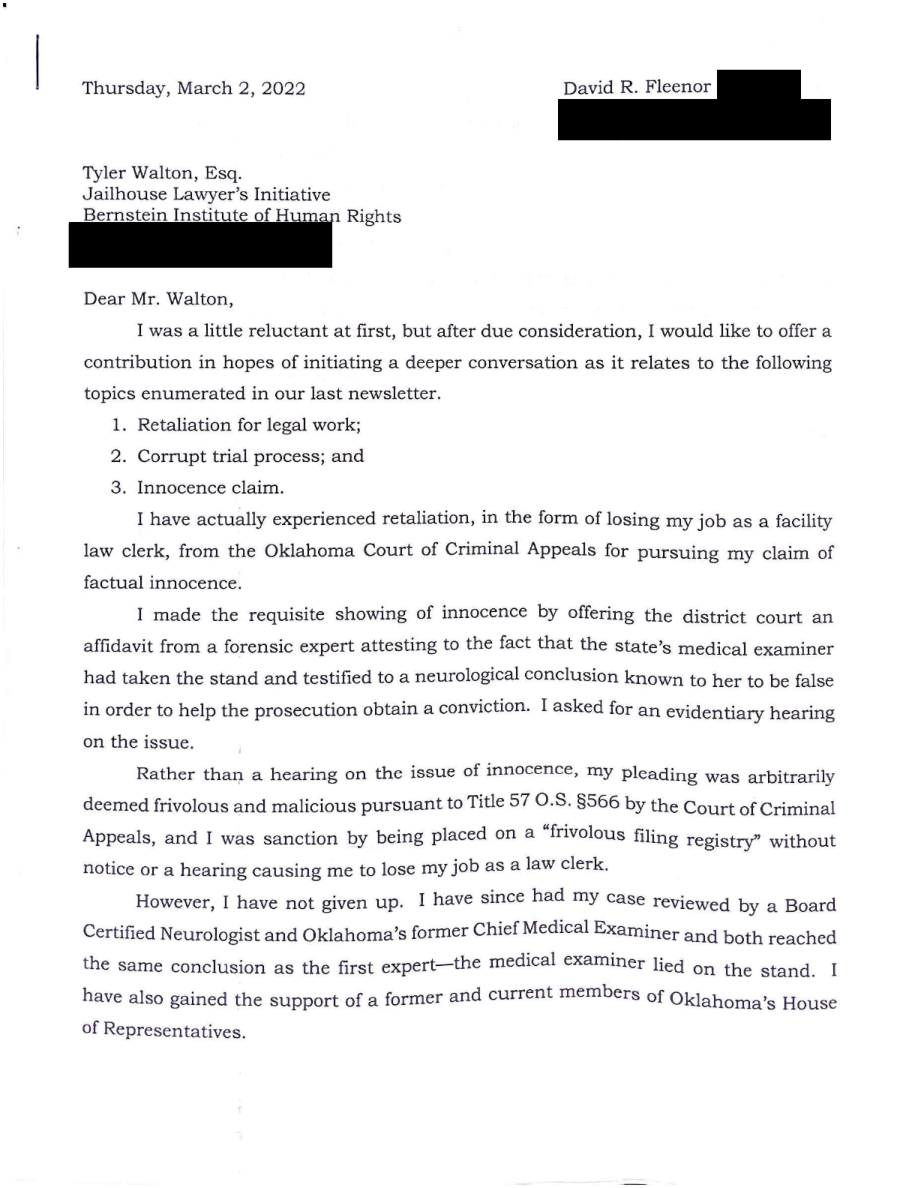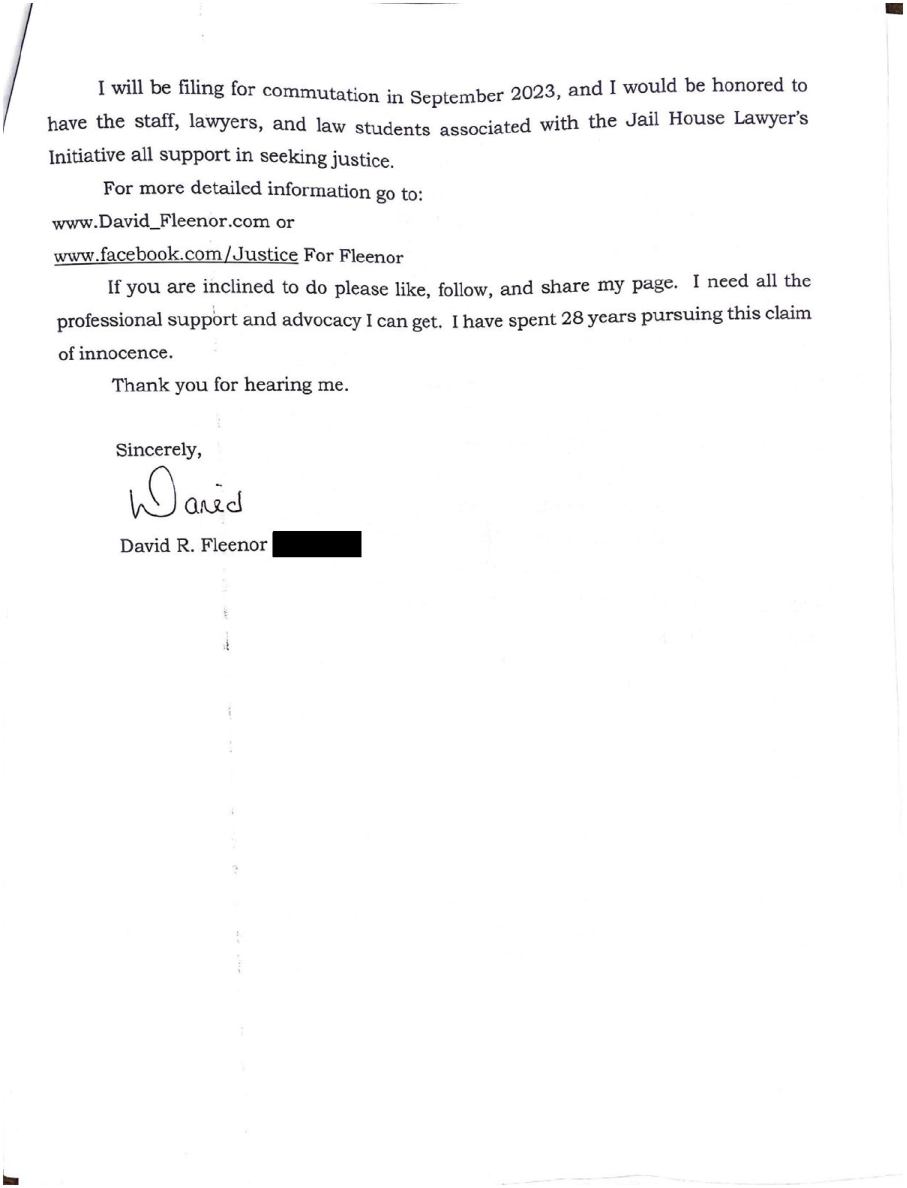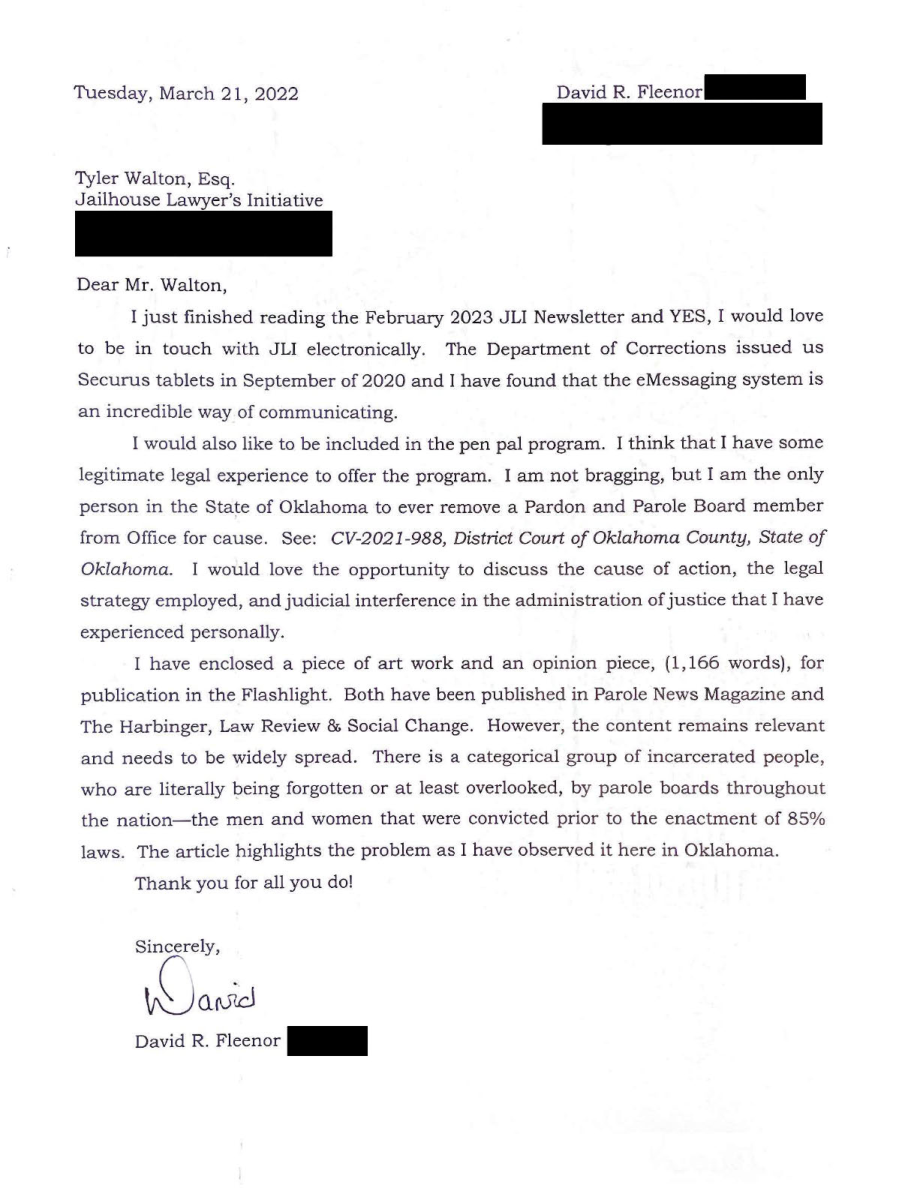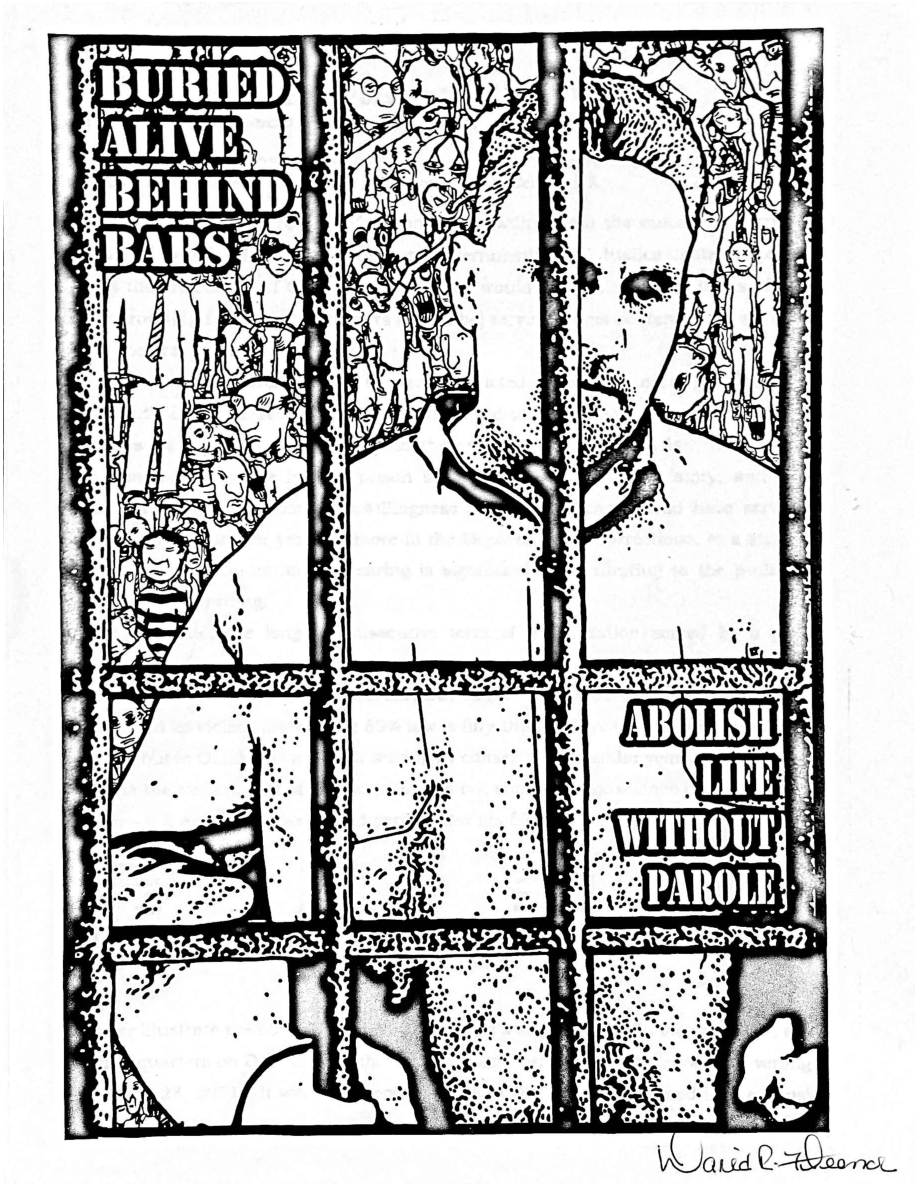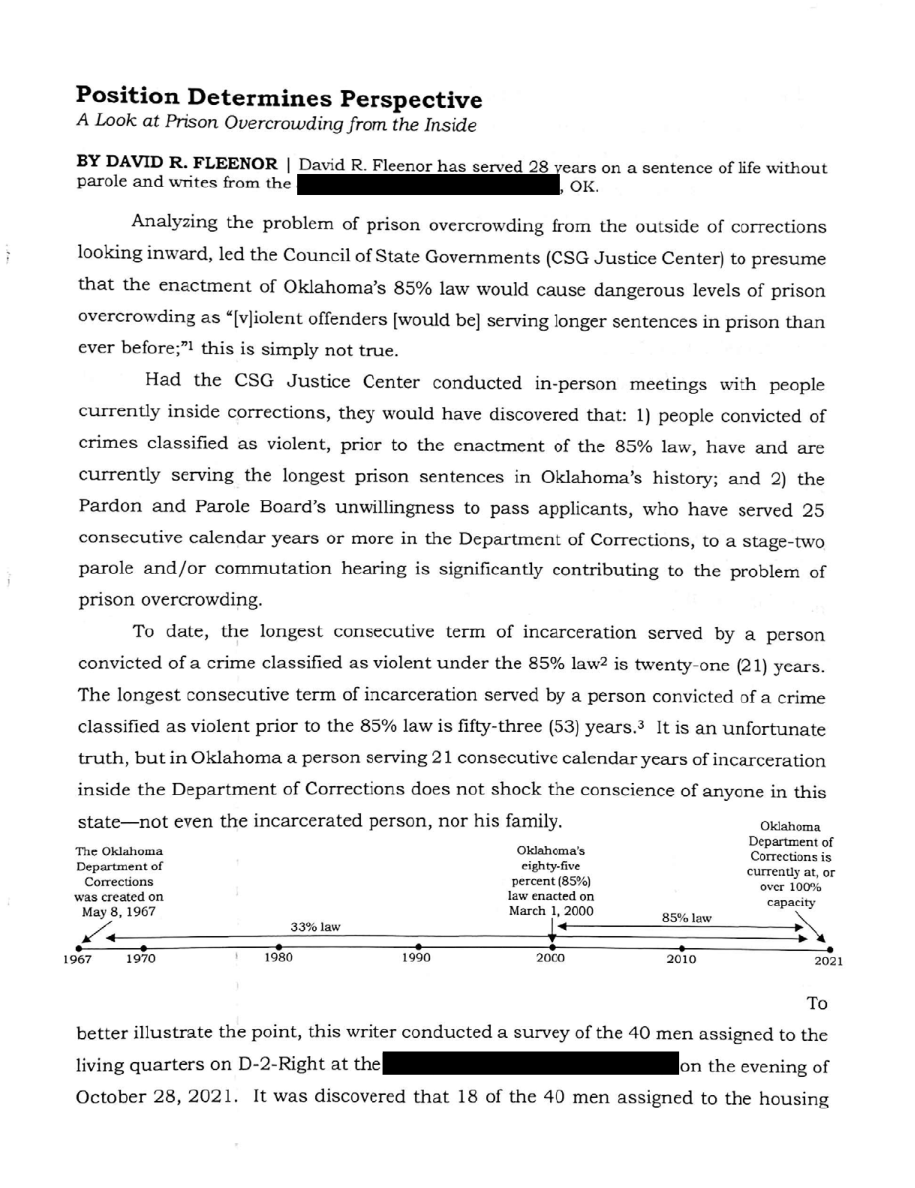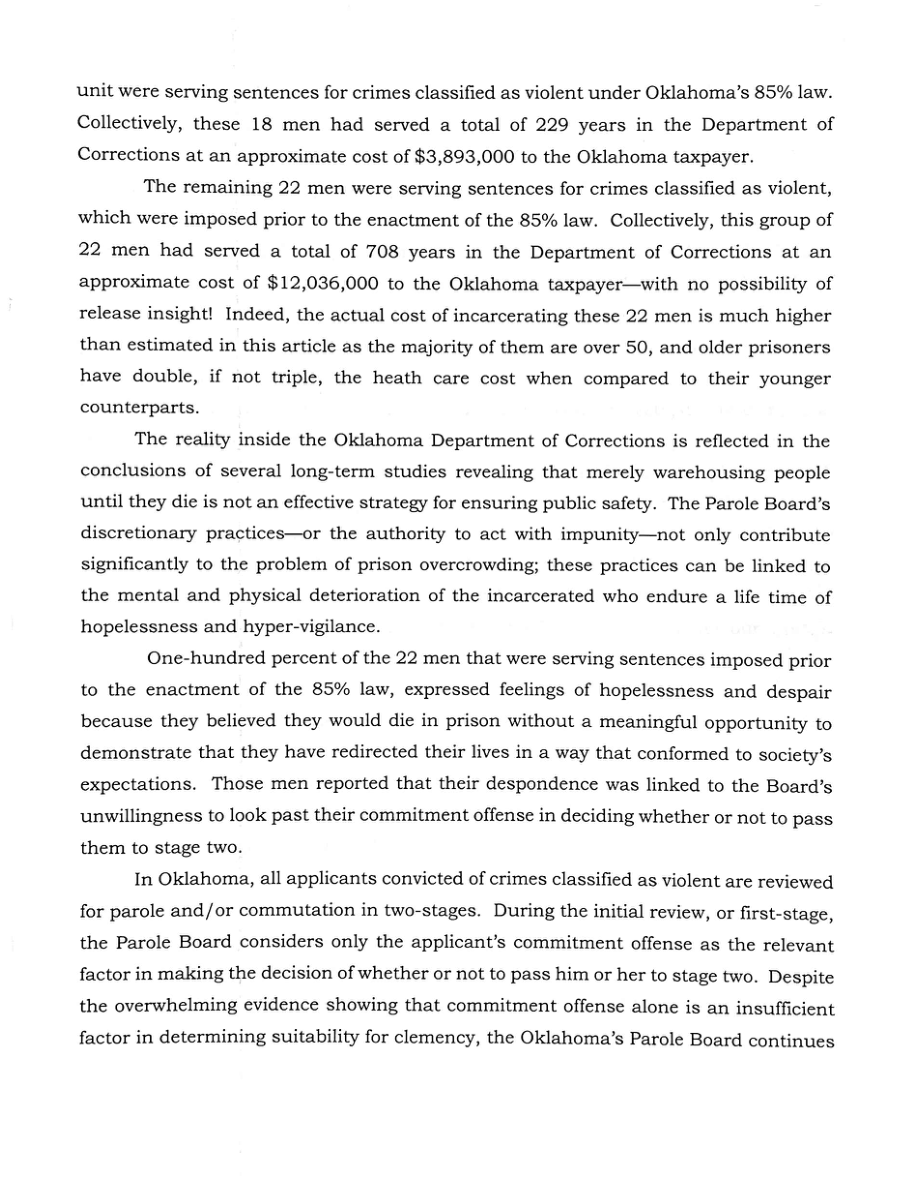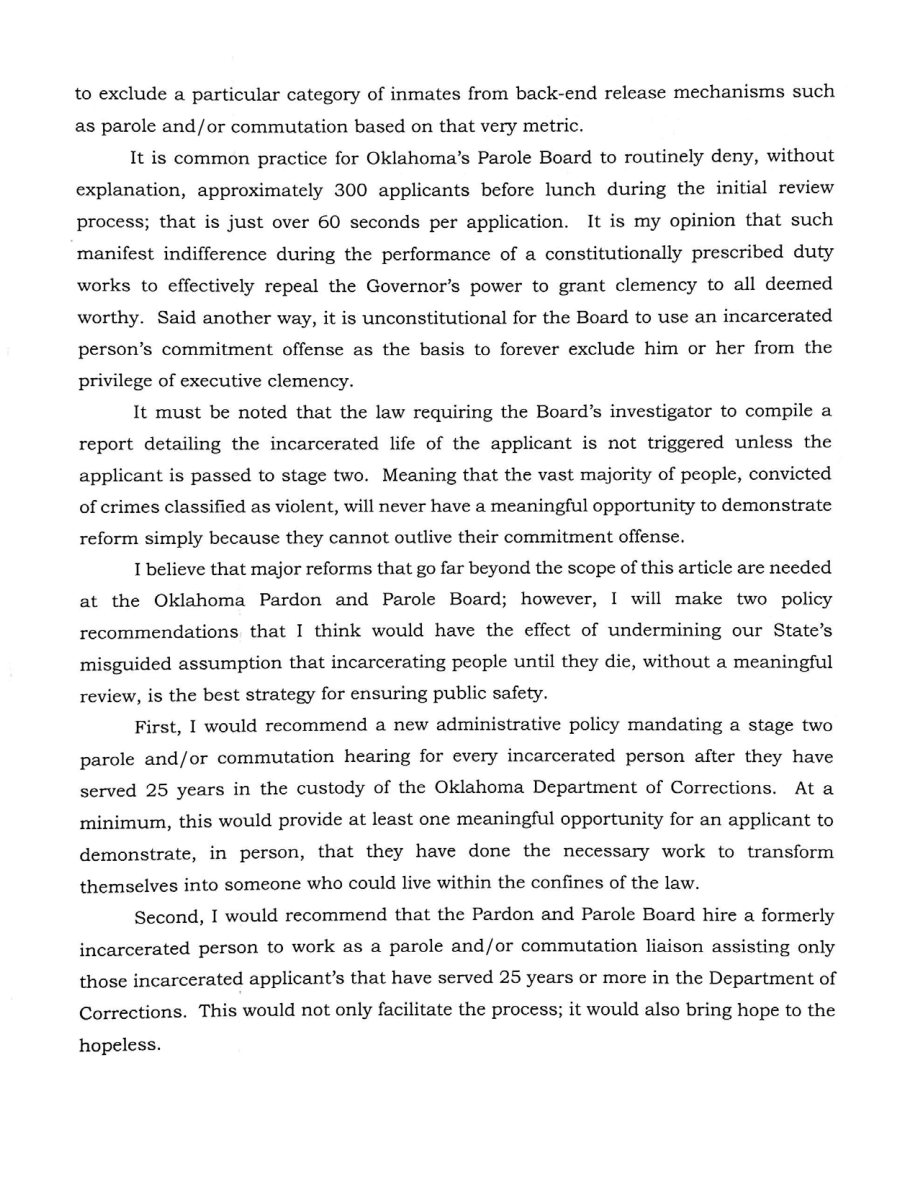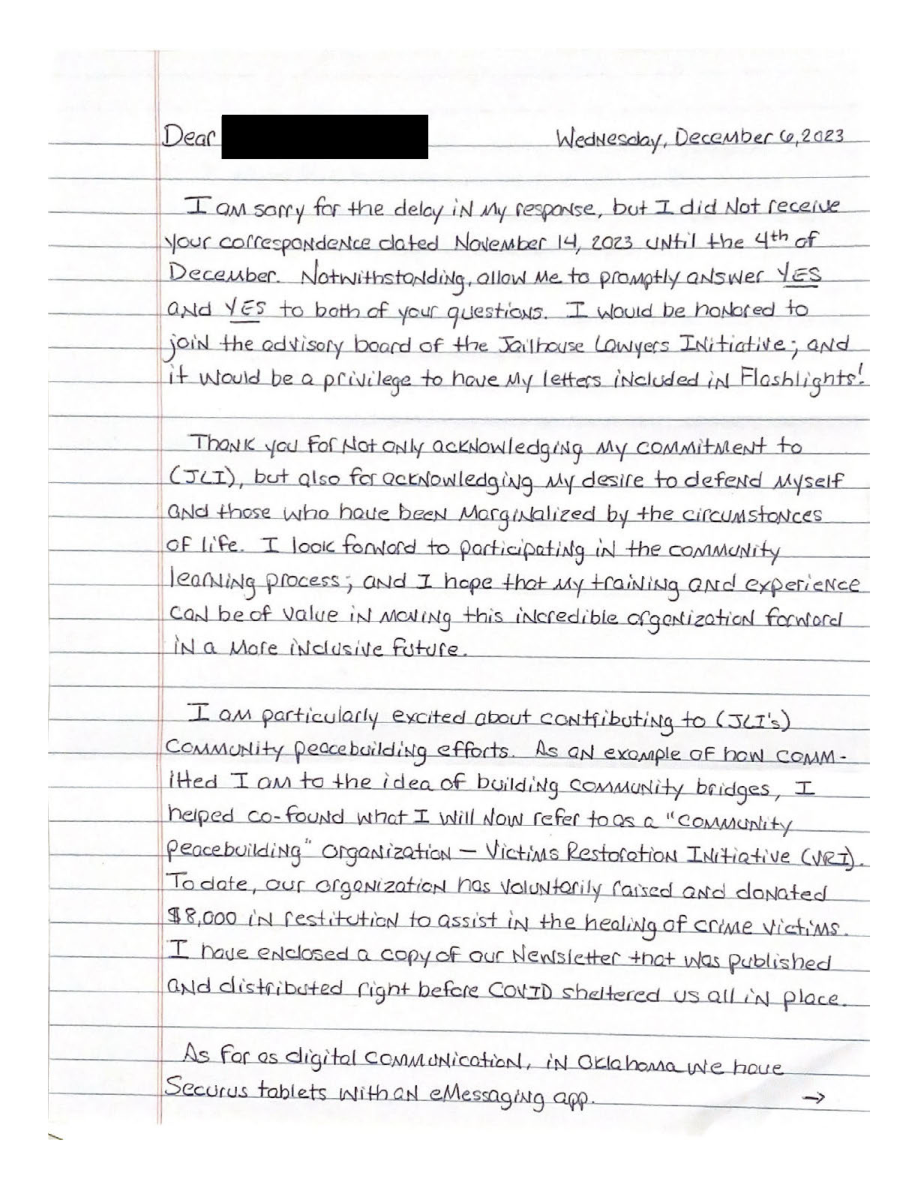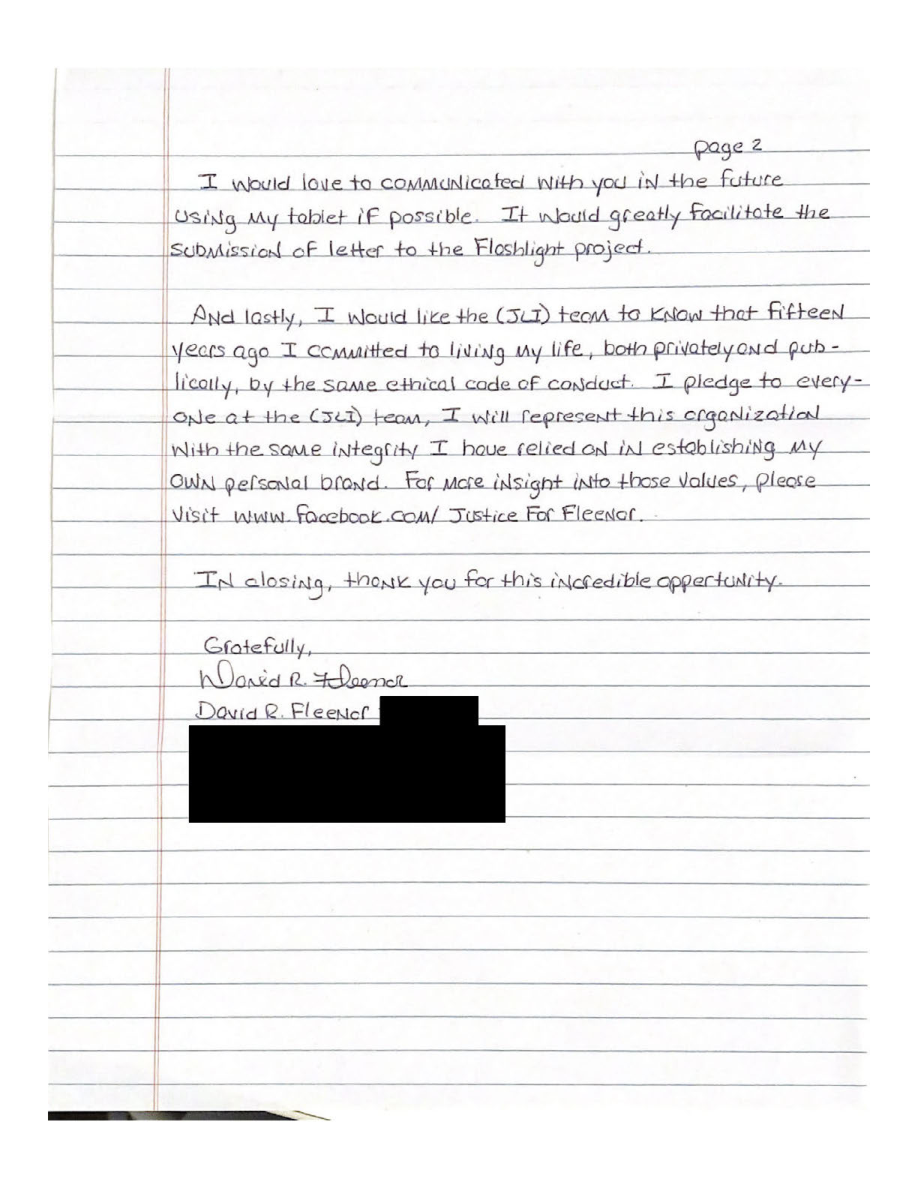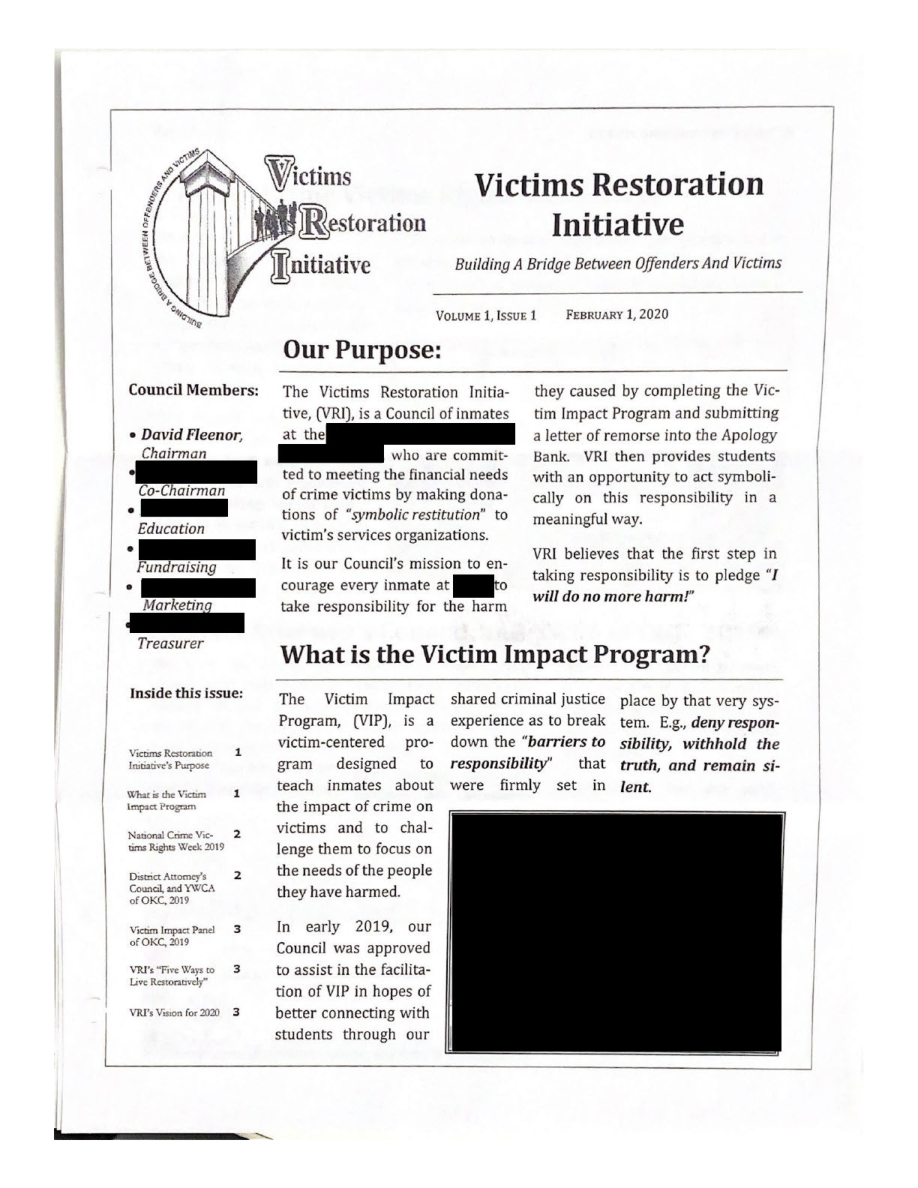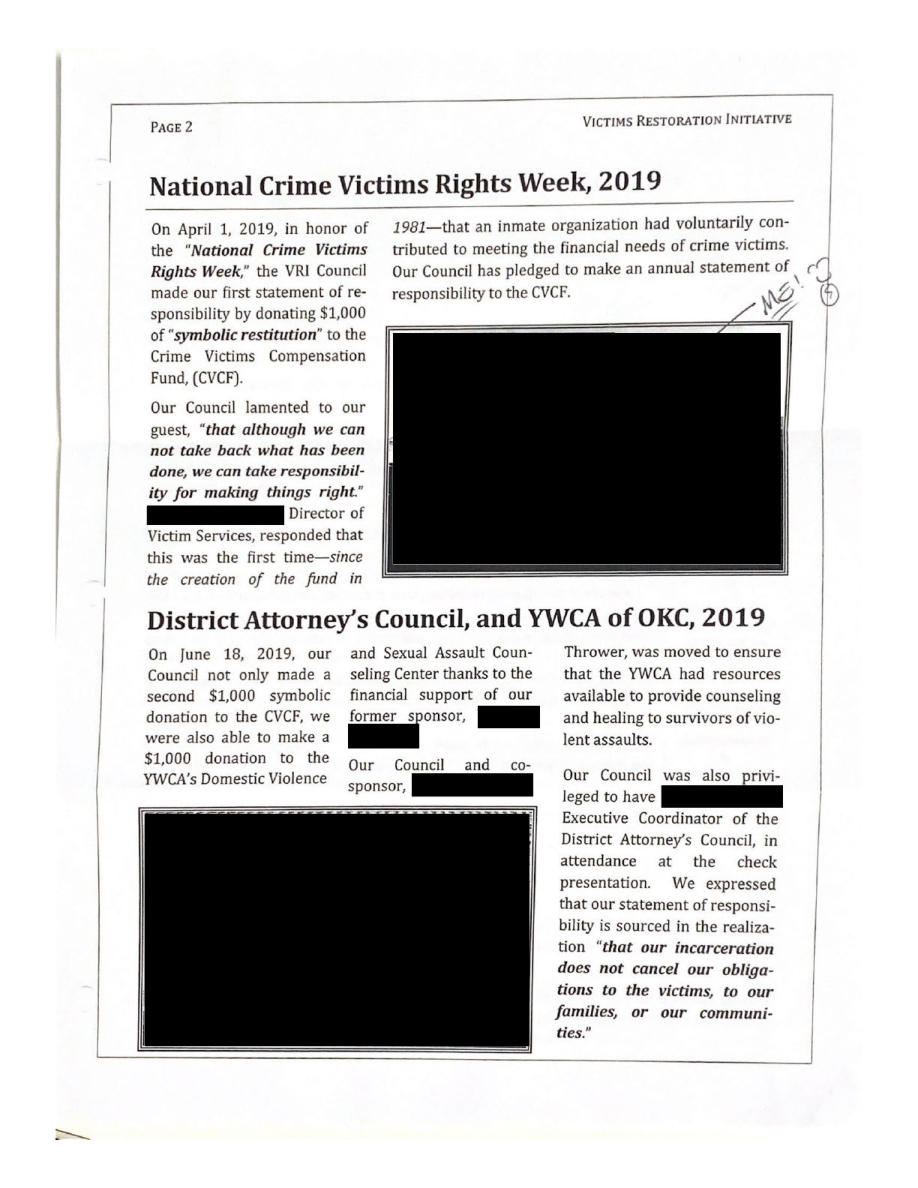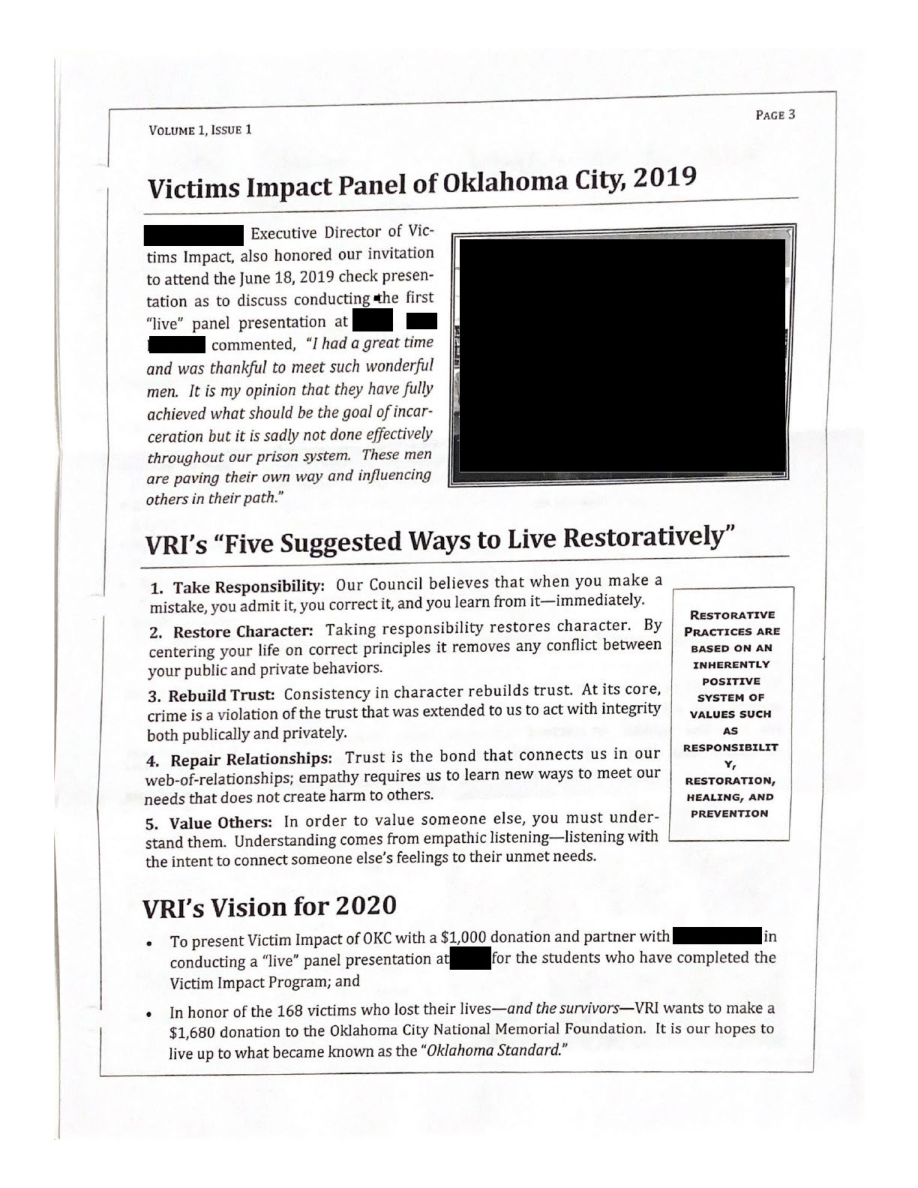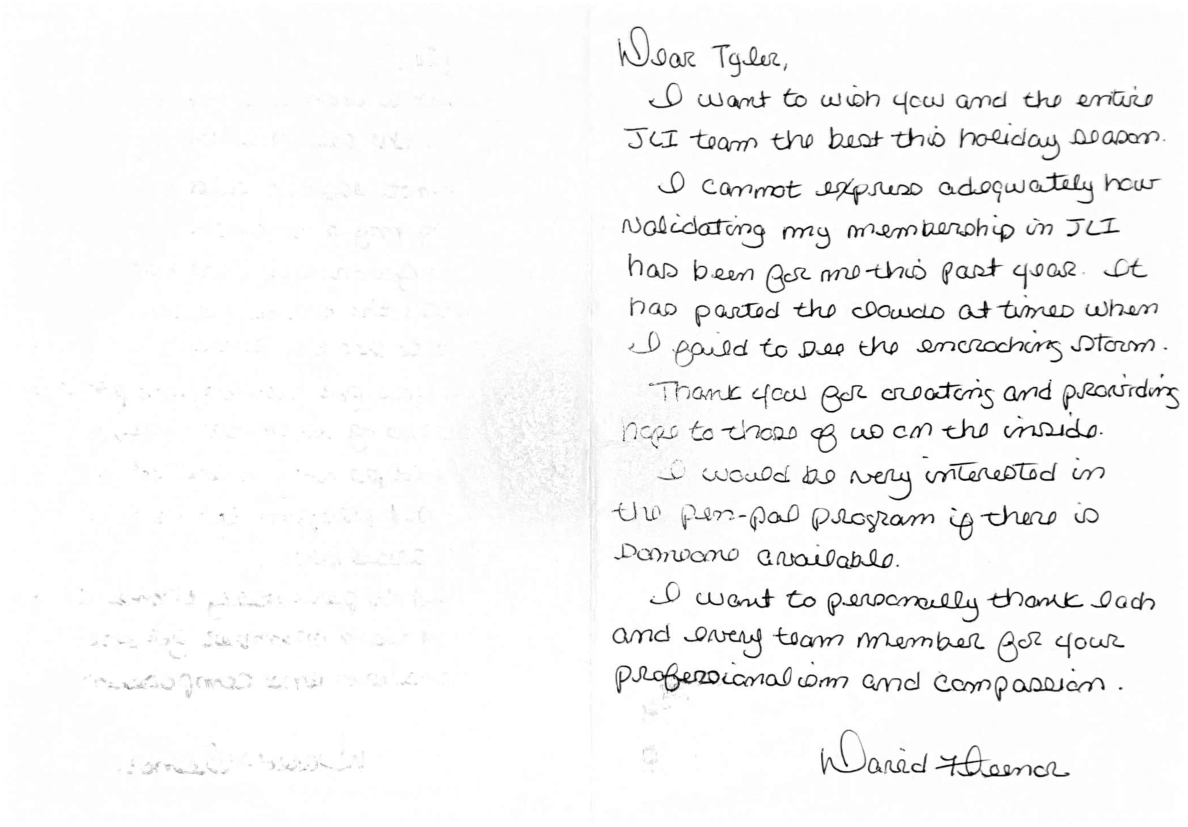David Ray Fleenor
David Ray Fleenor
transcription
November 4, 2019
David R. Fleenor [Redacted]
[Redacted] OK [Redacted]
Jhody Polk
Jailhouse Lawyer's Initiative
P.O. Box 2516
Alachua, FL 32615
Re: Guild Notes Volume 44, No. 1/2, Spring/Summer
2019
Mr. Polk,
After reading your article on page 17 of the Guild Notes, Beyond Bars, I could not help but feel
encouraged. I have been hesitant on writing you prior to today, because as I expected, you have been
swamped with tons of letters from law clerks and Jailhouse lawyers desperately needing access to a
formal legal education- I am no different [Italics]. [smiley face]
During the course of my practice as a law clerk, I caught the eye of attorney, [redacted]
who has offered me a job should my sentence of life without parole ever be commuted. One of my best
friends, who worked with me in the law library for a couple years, is currently working for Ms. [redacted
and is more than willing to contribute to the success of the Jailhouse Lawyers Initiative, (JLI), in whatever
way is needed for the State of Oklahoma.
Mr. Polk, I am very interested in formally continuing my legal education, and I am also capable of
covering a reasonable cost.
[page break]
I have a vision for the JLI's legal education that I would like to submit for your consideration. I
have always aspired to hold myself to the moral and ethical codes of conduct set forth by the National
Federation of Paralegal Association Inc. After receiving a formal education through JLI's legal training, do you think we could incorporate a paralegal association with continuing education and a code of conduct? [Question is highlighted green].
I would love to be a member of an association that holds it members to the same standards as national
and state bar associations. I would love to hear your feedback on this issue and more of your vision for
the formal legal training.
Mr. Polk, thank you for your time and consideration of my suggestion.
Dated: November 4, 2019
/S/ David R. Fleenor
[page 1 of 1]
David Ray Fleenor
transcription
Thursday, March 31, 2022
Jailhouse Lawyers Initiative
c/o Tyler Walton Esq.
[Redacted]
David R. Fleenor [Redacted]
[Redacted]
Re: Continuing legal education training module
Mr. Walton,
First, I want to thank you for the International Human Rights Law legal education training
module. When I received the training module, I truly felt as if my membership qualified me to share in
the victories of all my fellow jailhouse lawyers. I was eager to absorb the training module as to prove
my dedication to our organization. My membership to JLI has renewed my desire to use my legal
training to help those who cannot effectively communicate the injustices they have experienced-
thank you! [Smiley face]
I do have a couple of suggestions; and I would be more than willing to put in the work to see
them to completion, if they are compatible with the mission of JLI.
1. I would like to see JLI create a Model Code of Conduct for its membership.
I do believe that a Model Code of Conduct would inspire our membership to a higher level of
ethics, while serving the rehabilitative rationale.
2. I also would like to see JLI create an identification card for each of its members.
The identification card could be a stock business card with the JLI logo and the name and
identification number of each member.
3. I also think that a reasonable annual membership fee would help cover the cost of training
modules.
I would be willing to sponsor a member.
These are just a few suggestions; thank you for the impact you have had on my life!
In solidarity,
[Signature]
Privileged Communication: The foregoing communication contains privileged communication that is protected by law. It is intended solely for the named recipient. If you are not the intended recipient or their Agent, you are hereby notified that any review, dissemination, distribution, or duplication of this correspondence is strictly prohibited.
Page 1 of 1
David Ray Fleenor
transcription
Friday, December 23, 2022
David R. Fleenor [Redacted]
[Redacted]
Tyler Walton, Esq.
Jailhouse Lawyer's Initiative
Bernstein Institute of Human Rights
[Redacted]
Dear Mr. Walton,
First, I want to thank you and the Team for sending me the Jason Hernandez's
book GET CLEMENCY NOW. I am amazed at how many strategies both, Jason and I
have employed, to seek justice. We both used social media to create a clemency
strategy from prison. www.facebook.com/justiceforfleenor
Yes. I would love to be included in the pen pal program. I have very few people
in my life with whom I can celebrate a legal victory with. Don't get me wrong, they are
excited for me, but the accomplishment is not fully understood-especially considering
I drop out of high school.
Thank you for your time and your investment in my life.
Sincerely,
[Signature]
David R. Fleenor [Redacted]
David Ray Fleenor
transcription
David R. Fleenor [Redacted]
[Redacted]
Tyler Walton, Esq. Jailhouse Lawyer's Initiative
[Redacted]
Thursday, March 2, 2022
Dear Mr. Walton,
I would like to make a concurring contribution to the "Community Conversations."
I deeply empathize with the distresses of [Redacted]. I appeared in person before the Oklahoma Pardon & Parole Board in September 2020 seeking to have my sentence of life without parole commuted. In support of the request, I had completed every program available to me; I earned an Associate Degree; I graduated Phi Theta Kappa; I am a Certified Paralegal; and I was even awarded a Governor's Commendation for my community efforts. In my spare time, I started an inmate organization dedicated to restoring victims of crime. At the time I appeared before the Board we had donated $7,000. None of this was acknowledged or discussed during my hearing. I don't know what else to do!
Thank you for the opportunity.
Sincerely,
[Siganture]
David R. Fleenor [Redacted]
David Ray Fleenor
transcription
David R. Fleenor [Redacted]
[Redacted]
Tyler Walton, Esq.
Jailhouse Lawyer's Initiative
Bernstein Institute of Human Rights
[Redacted]
Thursday, March 2, 2022
I was a little reluctant at first, but after due consideration, I would like to offer a contribution in hopes of initiating a deeper conversation as it relates to the following topics enumerated in our last newsletter.
1. Retaliation for legal work;
2. Corrupt trial process; and
3. Innocence claim.
I have actually experienced retaliation, in the form of losing my job as a facility law clerk, from the Oklahoma Court of Criminal Appeals for pursuing my claim of factual innocence.
I made the requisite showing of innocence by offering the district court an affidavit from a forensic expert attesting to the fact that the state's medical examiner had taken the stand and testified to a neurological conclusion known to her to be false in order to help the prosecution obtain a conviction. I asked for an evidentiary hearing on the issue.
Rather than a hearing on the issue of innocence, my pleading was arbitrarily deemed frivolous and malicious pursuant to Title 57 O.S. §566 by the Court of Criminal Appeals, and I was sanction by being placed on a "frivolous filing registry" without notice or a hearing causing me to lose my job as a law clerk.
However, I have not given up. I have since had my case reviewed by a Board Certified Neurologist and Oklahoma's former Chief Medical Examiner and both reached the same conclusion as the first expert-the medical examiner lied on the stand. I have also gained the support of a former and current members of Oklahoma's House of Representatives.
I will be filing for commutation in September 2023, and I would be honored to have the staff, lawyers, and law students associated with the Jail House Lawyer's Initiative all support in seeking justice.
For more detailed information go to:
www.David_Fleenor.com or
www.facebook.com/ Justice For Fleenor
If you are inclined to do please like, follow, and share my page. I need all the professional support and advocacy I can get. I have spent 28 years pursuing this claim of innocence.
Thank you for hearing me.
Sincerely,
David R. Fleenor [Redacted]
David Ray Fleenor
transcription
Tuesday, March 21, 2022
David R. Fleenor [Redacted]
[Redacted]
Tyler Walton, Esq.
Jailhouse Lawyer's Initiative
[Redacted]
Dear Mr. Walton,
I just finished reading the February 2023 JLI Newsletter and YES, I would love
to be in touch with JLI electronically. The Department of Corrections issued us
Securus tablets in September of 2020 and I have found that the eMessaging system is
an incredible way of communicating.
I would also like to be included in the pen pal program. I think that I have some
legitimate legal experience to offer the program. I am not bragging, but I am the only
person in the State of Oklahoma to ever remove a Pardon and Parole Board member
from Office for cause. See: CV-2021-988, District Court of Oklahoma County, State of
Oklahoma. I would love the opportunity to discuss the cause of action, the legal
strategy employed, and judicial interference in the administration of justice that I have
experienced personally.
I have enclosed a piece of art work and an opinion piece, (1,166 words), for
publication in the Flashlight. Both have been published in Parole News Magazine and
The Harbinger, Law Review & Social Change. However, the content remains relevant
and needs to be widely spread. There is a categorical group of incarcerated people,
who are literally being forgotten or at least overlooked, by parole boards throughout
the nation-the men and women that were convicted prior to the enactment of 85%
laws. The article highlights the problem as I have observed it here in Oklahoma.
Thank you for all you do!
Sincerely,
[signature]
David R. Fleenor [Redacted]
[page 2]
BURIED ALIVE
BEHIND
BARS
[Graphic of a man grasping on to the bars of a cell. There are many small drawings of zombie-like people in the background, filling the prison cell.]
ABOLISH LIFE WITHOUT PAROLE
[David's signature]
[page 3]
Position Determines Perspective [Bold font]
A Look at Prison Overcrowding from the Inside
BY DAVID R. FLEENOR | David R. Fleenor has served 28 years on a sentence of life without parole and writes from the [Redacted], OK.
Analyzing the problem of prison overcrowding from the outside of corrections
looking inward, led the Council of State Governments (CSG Justice Center) to presume
that the enactment of Oklahoma's 85% law would cause dangerous levels of prison
overcrowding as "[v]iolent offenders [would be] serving longer sentences in prison than
ever before;"1 this is simply not true.
Had the CSG Justice Center conducted in-person meetings with people
currently inside corrections, they would have discovered that: 1) people convicted of
crimes classified as violent, prior to the enactment of the 85% law, have and are
currently serving the longest prison sentences in Oklahoma's history; and 2)
the Pardon and Parole Board's unwillingness to pass applicants, who have served 25
consecutive calendar years or more in the Department of Corrections, to a stage-two
parole and/or commutation hearing is significantly contributing to the problem of
prison overcrowding.
To date, the longest consecutive term of incarceration served by a person
convicted of a crime classified as violent under the 85% law2 is twenty-one (21) years.
The longest consecutive term of incarceration served by a person convicted of a crime
classified as violent prior to the 85% law is fifty-three (53) years.3 It is an unfortunate
truth, but in Oklahoma a person serving 21 consecutive calendar years of incarceration
inside the Department of Corrections does not shock the conscience of anyone in this
state-not even the incarcerated person, nor his family.
[Timeline ranging from 1967 to 2021. "The Oklahoma Department of Corrections was created on
May 8, 1967" is written above an arrow pointing to 1967. "33% law" is written near 1980.
"Oklahoma's eighty-five perecent (85%) law enacted on March 1, 2000" is written above an
arrow pointing to 2000. "85% law" is written above the period ranging from 2000-2021.
"Oklahoma Department of Correction is currently at, or over 100% capacity." is written
above an arrow pointing to 2021.]
To better illustrate the point, this writer conducted a survey of the 40 men assigned to the
living quarters on D-2-Right at the [Redacted] on the evening of
October 28, 2021. It was discovered that 18 of the 40 men assigned to the housing
unit were serving sentences for crimes classified as violent under Oklahoma's 85% law.
Collectively, these 18 men had served a total of 229 years in the Department of
Corrections at an approximate cost of $3,893,000 to the Oklahoma taxpayer.
The remaining 22 men were serving sentences for crimes classified as violent,
which were imposed prior to the enactment of the 85% law. Collectively, this group of
22 men had served a total of 708 years in the Department of Corrections at an
approximate cost of $12,036,000 to the Oklahoma taxpayer-with no possibility of
release insight! Indeed, the actual cost of incarcerating these 22 men is much higher
than estimated in this article as the majority of them are over 50, and older prisoners
have double, if not triple, the heath care cost when compared to their younger counterparts.
The reality inside the Oklahoma Department of Corrections is reflected in
the conclusions of several long-term studies revealing that merely warehousing people
until they die is not an effective strategy for ensuring public safety. The Parole Board's
discretionary practices-or the authority to act with impunity-not only contribute
significantly to the problem of prison overcrowding; these practices can be linked to
the mental and physical deterioration of the incarcerated who endure a life time of
hopelessness and hyper-vigilance.
One-hundred percent of the 22 men that were serving sentences imposed prior
to the enactment of the 85% law, expressed feelings of hopelessness and despair
because they believed they would die in prison without a meaningful opportunity to
demonstrate that they have redirected their lives in a way that conformed to society's
expectations. Those men reported that their despondence was linked to the Board's
unwillingness to look past their commitment offense in deciding whether or not to pass
them to stage two.
In Oklahoma, all applicants convicted of crimes classified as violent are reviewed
for parole and/or commutation in two-stages. During the initial review, or first-stage,
the Parole Board considers only the applicant's commitment offense as the relevant
factor in making the decision of whether or not to pass him or her to stage two. Despite
the overwhelming evidence showing that commitment offense alone is an insufficient
factor in determining suitability for clemency, the Oklahoma's Parole Board continues
to exclude a particular category of inmates from back-end release mechanisms such
as parole and/or commutation based on that very metric.
It is common practice for Oklahoma's Parole Board to routinely deny, without
explanation, approximately 300 applicants before lunch during the initial review
process; that is just over 60 seconds per application. It is my opinion that such
manifest indifference during the performance of a constitutionally prescribed duty
works to effectively repeal the Governor's power to grant clemency to all deemed
worthy. Said another way, it is unconstitutional for the Board to use an incarcerated
person's commitment offense as the basis to forever exclude him or her from the
privilege of executive clemency.
It must be noted that the law requiring the Board's investigator to compile a
report detailing the incarcerated life of the applicant is not triggered unless the
applicant is passed to stage two. Meaning that the vast majority of people, convicted
of crimes classified as violent, will never have a meaningful opportunity to demonstrate
reform simply because they cannot outlive their commitment offense.
I believe that major reforms that go far beyond the scope of this article are needed
at the Oklahoma Pardon and Parole Board; however, I will make two policy
recommendations that I think would have the effect of undermining our State's
misguided assumption that incarcerating people until they die, without a meaningful
review, is the best strategy for ensuring public safety.
First, I would recommend a new administrative policy mandating a stage two
parole and/or commutation hearing for every incarcerated person after they have
served 25 years in the custody of the Oklahoma Department of Corrections. At a
minimum, this would provide at least one meaningful opportunity for an applicant to
demonstrate, in person, that they have done the necessary work to transform
themselves into someone who could live within the confines of the law.
Second, I would recommend that the Pardon and Parole Board hire a formerly
incarcerated person to work as a parole and/or commutation liaison assisting only
those incarcerated applicant's that have served 25 years or more in the Department of
Corrections. This would not only facilitate the process; it would also bring hope to the
hopeless.
[Footnotes]
1 Justice Reinvestment in Oklahoma, The Council of State Governments, (January 2012), page 18.
2 In 1999 House Bill 1008 created two new sections of law, Title 21 O.S.1999 §§12.1 and 13.1, colloquially known as the 85% law.
3 [Redacted] has been incarcerated in the Oklahoma Department of Corrections since 1967.
David Ray Fleenor
transcription
Dear [Redacted]
Wednesday, December 6, 2023
I am sorry for the delay iN My response, but I did Not receive
your correspoNdeNce dated November 14, 2023 UNtil the 4th of
December. NotwithstaNding, allow Me to proMptly aNswer YES
and YES to both of your questioNs. I would be honored to
joiN the advisory board of the Jailhouse Lawyers Initiative; and
it would be a privilege to have My letters included in Flashlights!
Thank you For Not Only acknowledging My commitment to
(JLI), but also for acknowledging My desire to defend Myself
and those who have been Marginalized by the circumstances
OF life. I look forward to participating in the Community
learning process; and I hope that My training and experience
Can be of value IN MOVING this incredible organization forword
IN a More inclusive future.
I am particularly excited about contributing to (JLI's)
CoMMUNity peacebuildiNg efforts. As AN example of how coMMited
I am to the idea of buildiNg COMMUNity bridges, I
helped co-found what I will Now refer to as a "COMMUNity
Peacebuilding"organization - Victims Restoration Initiative (VRI).
To date, our organization has voluntarily raised and donated
$8,000 IN restitution to assist in the healing of crime victims.
I have enclosed a copy of our Newsletter that was published
and distributed right before COVID sheltered us all in place
As for as digital COMMUNication, IN Oklahoma We have
Securus tablets with AN eMessaging app.
page 2
I would love to communicated with you in the future
Using My tablet if possible. It would greatly facilitate the
Submission of letter to the Flashlight project
And lastly, I would like the (JLI) team to KNOW that Fifteen
years ago I committed to living my life, both privately and pub-
lically, by the same ethical code of conduct. I pledge to every-
ONE at the (JLI) team, I will represent this organization
With the same integrity I have relied ON IN establishing My
OWN personal brand. For More insight into those values, please
Visit www. Facebook.com/ Justice For FleeNor
IN closing, thank you for this incredible opportunity.
Gratefully,
[Signature]
David R. FleeNor [Redacted]
[Redacted]
Victims Restoration Initiative
Council Members:
. [Redacted], Chairman
. [Redacted], Co-Chairman
· [Redacted], Education
· [Redacted], Fundraising
· [Redacted], Marketing
. [Redacted], Treasurer
Inside this issue:
. Victims Restoration Initiative's Purpose [Page 1]
. What is the Victim Impact Program [Page 1]
· [National Crime Victims Rights Week 2019 [Page 2]
· District Attorney's Council, and YWCA of OKC, 2019 [Page 2]
· Victim Impact Panel of OKC, 2019 [Page 3]
. VRI's "Five Ways to Live Restoratively" {Page 3]
. VRI's Vision for 2020 [Page 3]
Our Purpose:
The Victims Restoration Initia-
tive, (VRI), is a council of inmates
at the [Redacted] who are committed
to meeting the financial needs
of crime victims by making dona-
tions of "Symbolic restitution" to
victim's services organization.
It is our Council's mission to en-
courage every inmate at [Redacted] to
take responsibility for the harm
they caused by completing the Vic-
tim Impact Program and submitting
a letter of remorse into the Apology
Bank. VRI then provides students
with an opportunity to act symboli-
cally on this responsibility in a
meaningful way.
VRI believes that the first step in
taking responsibility is to pledge "I
will do no more harm!"
What is the Victim Impact Program?
The Victim Impact
Program, (VPI) is a
victim-centered pro-
gram designed to
teach inmates about
the impact of crime on
victims and to chal-
lenge them to focus
on the needs of the people
they have harmed.
In early 2019, our
Council was approved
to assist in the facilita-
tion of VIP in hopes of
better connecting with
students through our
shared criminal justice
experience as to break
down the "barriers to
responsibility" that
were firmly set in
place by the very sys-
tem. E.g., deny respon-
sibility, withhold the
truth, and remain silent.
[Redacted image]
PAGE 2
VICTIMS RESTORATION INITIATIVE
National Crime Victims Rights Week, 2019
On April 1, 2019, in honor of
the "National Crime Victims
Rights Week," the VRI Council
made our first statement of re-
sponsibility by donating $1,000
of "symbolic restitution" to the
Crime Victims Compensation
Fund, (CVCF).
Our Council lamented to our
guest, "that although we can
not take back what has been
done, we can take responsibil-
ity for making things right."
[Redacted] Director of
Victim Services, responded that
this was the first time-since
the creation of the fund in
1981-that an inmate organization had voluntarily con-
tributed to meeting the financial needs of crime victims.
Our Council has pledged to make an annual statement of
responsibility to the CVCF.
[Redacted image]
District Attorney's Council, and YWCA of OKC, 2019
On June 18, 2019, our
Council not only made a
Second $1,000 symbolic
donation to the CVCF, we
were also able to make
a $1,000 donation to the
YWCA's Domestic Violence
and sexual Assault Coun-
selling Center thanks to the
financial support of our
former sponsor, [Redacted].
Our Council and co-sponsor, [Redacted]
[Redacted image]
Thrower, was moved to ensure
that YWCA had resources
available to provide counseling
to survivors of violent assaults
Our Council was also privi-
leged to have [Redacted]
Executive Director of the
District Attorney's Council, in
attendance at the check
presentation. We expressed
that our state of responsi-
bility is sourced in realiza-
tion "that our incarceration
does not cancel our obli-
gations to the victims, to our
families, or our communities."
PAGE 3
Victims Impact Panel of Oklahoma City, 2019
[Redacted image]
[Redacted] Executive Director of Vic-
tims Impact, also honored our invitation
to attend the June 18, 2019 check presen-
tation as to discuss conducting the first
"live" panel presentation at [Redacted] [Redeacted]
commented, "I had a great time
and was thankful to meet such wonderful
men. It is my opinion that they have fully
achieved what should be the goal of incar-
ceration but it is sadly not done effectively
throughout our prison system. These men
are paving their own way and influencing
others in their path."
VRI's "Five Suggested Ways to Live Restoratively"
1. Take Responsibility: Our Council believes that when you make a
mistake, you admit it, you correct it, and you learn from it-immediately.
2. Restore Character: Taking responsibility restores character. By
centering your life on correct principles it removes any conflict between
your public and private behaviors.
3. Rebuild Trust: Consistency in character rebuilds trust. At its core,
crime is a violation of the trust that was extended to us to act with integrity
both publically and privately.
4. Repair Relationships: Trust is the bond that connects us in our
web-of-relationships; empathy requires us to learn new ways to meet our
needs that does not create harm to others.
5. Value Others: In order to value someone else, you must under-
stand them. Understanding comes from empathic listening-listening with
the intent to connect someone else's feelings to their unmet needs.
RESTORATIVE
PRACTICES ARE
BASED ON AN
INHERENTLY
POSITIVE
SYSTEM OF
VALUES SUCH
AS
RESPONSIBILITY
RESTORATION,
HEALING, AND
PREVENTION
VRI's Vision for 2020
· To present Victim Impact of OKC with a $1,000 donation and partner with Ms. Romero in conducting a "live" panel presentation at JHCC for the students who have completed the Victim Impact Program; and
. In honor of the 168 victims who lost their lives-and the survivors-VRI wants to make a $1,680 donation to the Oklahoma City National Memorial Foundation. It is our hopes to live up to what became known as the "Oklahoma Standard."
David Ray Fleenor
transcription
WISH YOU WERE HERE [these words are crossed out]
I WISH I WAS THERE
[Image of a cabin covered in snow. A tree with no leaves is on the front left hand-side of the cabin and four pine trees are visible in the background]
Dear Tyler,
I want to wish you and the entire
JLI team the best this holiday season.
I cannot express adequately how
validating my membership in JLI
has been for me this past year. It
has parted the clouds at times when
I failed to see the encroching storm.
Thank you for creating and providing
hope to those of us on the inside.
I would be very interested in
the pen-pal program if there is
someone available.
I want to personally thank each
and every team member for your
professionalism and compassion.
David Fleenor

